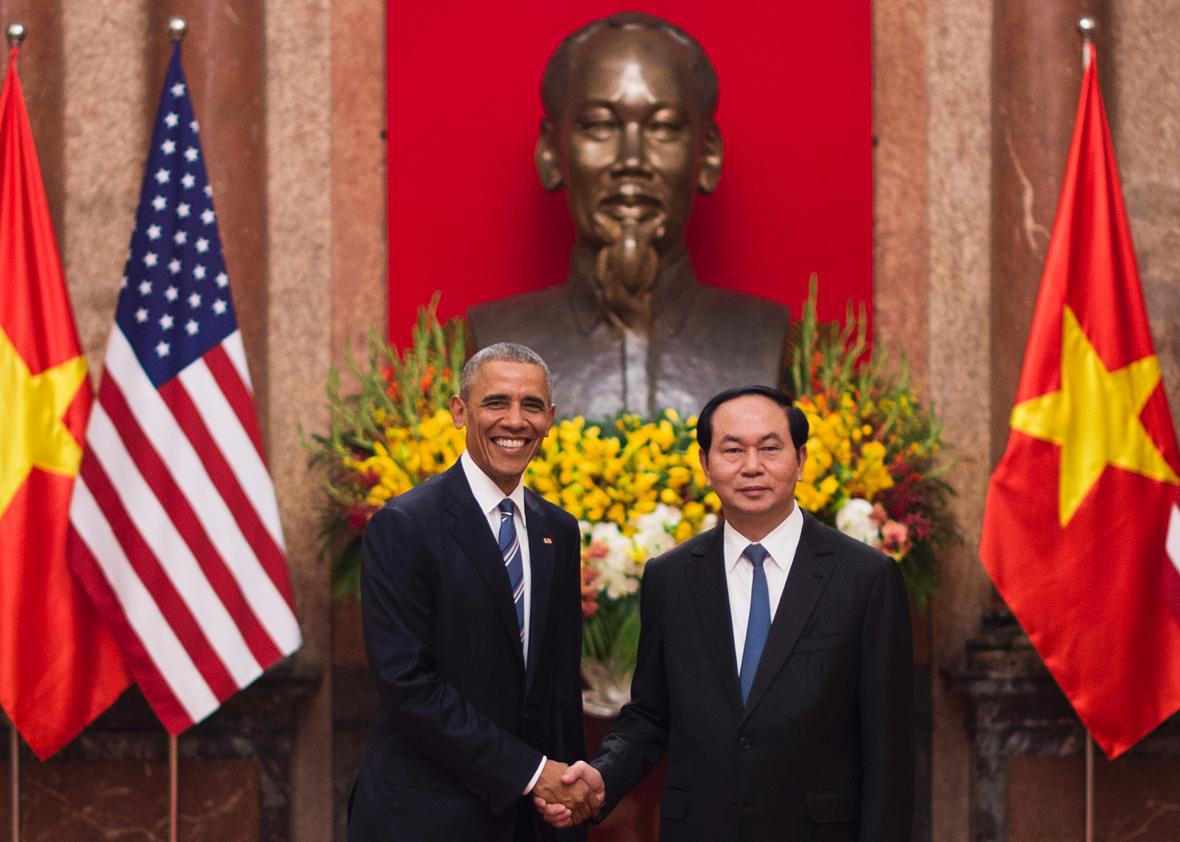Update, 8:15 a.m.: The U.S. fully lifted the arms embargo this morning.
President Obama’s visit to Vietnam this week comes amidst a debate about American arms sales to the country. The current, partial American arms embargo—which had been in place since 1984, and has not been lifted because of human rights violations by the Vietnamese government—is seen by some as outdated given China’s rise in the region. But, although America has been encouraging allies to build up their own defenses against China, Vietnam remains an extremely repressive country.
To discuss the state of human rights in Vietnam, I spoke by phone with John Coughlan, a researcher at Amnesty International for Cambodia, Laos, and Vietnam. We discussed the Vietnamese government’s record of repression, Obama’s trip, and the surprising Vietnamese attitude toward Americans lecturing them on human rights. The conversation has been edited and condensed.
Isaac Chotiner: How has the human rights situation in Vietnam changed in recent years?
John Coughlan: Vietnam is a closed country. There are tight limitations on media and civil society organizations. Legally and formally, human rights organizations and unions cannot exist independently of the Communist Party of Vietnam. It is broadly acknowledged that there has been some small relaxation of restrictions over the years. There is still no mainstream independent media, but there is a proliferation of blogs, and people are increasingly able to access social media like Facebook. There are more ways for people to share information about what is happening inside the country. That being said, restrictions still persist. Even international human rights organizations still don’t have research access to the country. We estimate conservatively that there are currently 83 prisoners of conscience detained in Vietnam. That’s 83 men and women who have been imprisoned for voicing legitimate opinions and taking part in legitimate and peaceful activism.
What issues in Vietnam are people currently protesting?
There were anti-Chinese demonstrations a few years back. The relationship is certainly something that energizes people within Vietnam. For the last three weeks in Vietnam, there have been organized demonstrations calling on the government to provide information about an ecological catastrophe facing the country. Huge numbers of fish stock have been dying in coastal waters. People are calling for the government to provide answers, which they feel are not forthcoming. There have been demonstrations, or at least people have tried to demonstrate. It has been met with a heavy hand from the government, such as police measures including torture. This environmental disaster has really energized the population. We are seeing a lot of people taking real risks to demonstrate. So Obama’s visit is certainly interestingly timed. I am sure it wasn’t the intention, but he is coming at a time when many people are forbidden from leaving their homes to go to demonstrations, and demonstrators are being beaten up and detained.
Has the possibility of the U.S. embargo being lifted influenced the Vietnamese government at all?
It’s always hard to tell with these things, but it seems that a lot of these deals, or trade deals between the U.S. and Vietnam, go on without human rights being taken into consideration. Obama will be the fourth consecutive U.S. president to visit Vietnam; relations are certainly normalizing, but we aren’t seeing that human rights are at all central to that relationship.
What is the domestic reaction when America lectures the country on human rights, given the unhappy history of American involvement in the country?
That’s a very interesting question. Broadly speaking, people within the country see any discussions that may lead to a relaxation of restrictions as a positive thing.
That’s fascinating, given our legacy there.
People in the country see America as representing certain values like freedom of speech and freedom of assembly. These are rights in Vietnam that are very tightly restricted. So, if Obama was to call on the government to relax restrictions, people will not be thinking, “how dare he.” It would be seen as an act of solidarity. I think when Obama comes, most Vietnamese people will feel extremely proud. The problem is that human rights do not seem to be central to the visit.
This post has been updated with new information since it was originally published.
